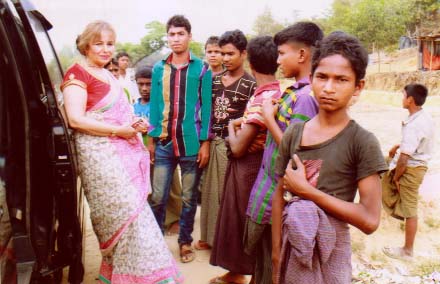
Cox’s Bazar Correspondent :
Bengal Centre ( Bengalzentrum , e v ), a non-profit organisation has been working for improving socio-economic condition of Rohingya people who were forced to leave Myanmar for Bangladesh with their own fund .
On March 16, Nazmun Nesa Piari , President of the organization visited different camps in Cox’s Bazar including Kutupalang, Balukhali, Lomboshikha . When she visited the areas , found many NGOs are working to impart education to the forced migrated children here and they are also providing healthcare to them . The children narrated their sufferings to Nazmun Nesa Piari and demanded more facilities for them .
The social workers who are working for their welfare said, the children are mentally affected due to forced displacement from the Rakhine state in Myanmar and they lack manners and basic knowledge about their livelihood .
It is mentionable that violence in Rakhine State which began on 25 August 2017 has driven an estimated 655,500 Rohingya across the border into Cox’s Bazar in Bangladesh. The speed and scale of the influx has resulted in a critical humanitarian emergency. The people who have arrived in Bangladesh since 25 August came with very few possessions.
They have used most their savings on transportation and constructing a shelter, often out of no more than bamboo and thin plastic. They are now reliant on humanitarian assistance for food, and other life-saving needs. Basic services that were available prior to the influx are under severe strain due to the massive increase in people in the area. In some of the sites that have spontaneously emerged, water and sanitation facilities are limited or of poor quality, with extremely high density raising the risks of an outbreak of disease. The Rohingya population in Cox’s Bazar is highly vulnerable, having fled conflict and experienced severe trauma, and now living in extremely difficult conditions.
Population movements within Cox’s Bazar remain highly fluid, with increasing concentration in Ukhia, where the Government has allocated 3,000 acres for a new camp. People arrived at the new site before infrastructure and services could be established. Humanitarian partners are now building necessary infrastructure in challenging conditions, with extremely limited space.
Nazmun Nesa Piari , President, Bengal Centre ( Bengalzentrum , e v ) while talking to this correspondent said, they need more care on humanitarian grounds and after going back to Germany I will discuss the matter with donor agencies to take up a project for the overall development of the Rohingya people.
Bengal Centre ( Bengalzentrum , e v ), a non-profit organisation has been working for improving socio-economic condition of Rohingya people who were forced to leave Myanmar for Bangladesh with their own fund .
On March 16, Nazmun Nesa Piari , President of the organization visited different camps in Cox’s Bazar including Kutupalang, Balukhali, Lomboshikha . When she visited the areas , found many NGOs are working to impart education to the forced migrated children here and they are also providing healthcare to them . The children narrated their sufferings to Nazmun Nesa Piari and demanded more facilities for them .
The social workers who are working for their welfare said, the children are mentally affected due to forced displacement from the Rakhine state in Myanmar and they lack manners and basic knowledge about their livelihood .
It is mentionable that violence in Rakhine State which began on 25 August 2017 has driven an estimated 655,500 Rohingya across the border into Cox’s Bazar in Bangladesh. The speed and scale of the influx has resulted in a critical humanitarian emergency. The people who have arrived in Bangladesh since 25 August came with very few possessions.
They have used most their savings on transportation and constructing a shelter, often out of no more than bamboo and thin plastic. They are now reliant on humanitarian assistance for food, and other life-saving needs. Basic services that were available prior to the influx are under severe strain due to the massive increase in people in the area. In some of the sites that have spontaneously emerged, water and sanitation facilities are limited or of poor quality, with extremely high density raising the risks of an outbreak of disease. The Rohingya population in Cox’s Bazar is highly vulnerable, having fled conflict and experienced severe trauma, and now living in extremely difficult conditions.
Population movements within Cox’s Bazar remain highly fluid, with increasing concentration in Ukhia, where the Government has allocated 3,000 acres for a new camp. People arrived at the new site before infrastructure and services could be established. Humanitarian partners are now building necessary infrastructure in challenging conditions, with extremely limited space.
Nazmun Nesa Piari , President, Bengal Centre ( Bengalzentrum , e v ) while talking to this correspondent said, they need more care on humanitarian grounds and after going back to Germany I will discuss the matter with donor agencies to take up a project for the overall development of the Rohingya people.

